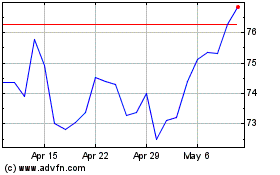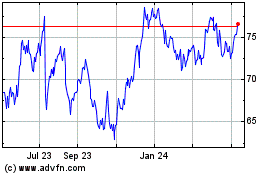UPDATE: For Banks, Euro Crisis Meant Less Trading Revenue In 1Q
April 17 2012 - 11:56AM
Dow Jones News
The impact of the euro crisis continued to hit banks' trading
revenue in the first quarter as jittery investors pulled out of
bond, currency and related markets.
Goldman Sachs Group Inc. (GS) and State Street Corp. (STT)
reported Tuesday their trading units, which include foreign
exchange, suffered from lower revenue and volume during the
period.
Foreign-exchange trading volumes have fallen broadly around the
world as the European sovereign-debt crisis has scared off
investors. Global volumes collapsed at the end of 2011 and into
early 2012, the Bank for International Settlements said in
March.
Early reports from banks during this week's earnings season hint
at ongoing weakness in currency markets.
At State Street, first-quarter foreign-exchange revenue fell 7%
from a year earlier, contributing to a 7% fall in trading-services
revenue, to $280 million. The bank blamed worried investors for the
general slowdown in trading.
Over all, State Street earned $427 million during the quarter,
down from $471 million in the previous year's quarter. It posted
revenue of $2.42 billion for the first quarter, up 2.5% from a year
earlier.
Goldman said first-quarter net revenue from its fixed income,
currency and commodities unit fell to $3.46 billion, 20% below last
year's comparable quarter.
"Our currencies business benefited from stronger performance in
our emerging-markets businesses," said David Viniar, Goldman's
chief financial officer, in a conference call with analysts. The
unit's best results came from interest-rate products, with other
bright spots in mortgages and credit, he said.
The uncertainty surrounding the euro zone's fiscal troubles has
kept trading clients away from the markets, Viniar said, calling
the unit's performance this quarter "good but not great."
"Our clients have been cautious on risk and remain cautious on
risk," he said, noting the problems are
"macroeconomics-driven."
World-wide average daily currency-trading volume hit $4.7
trillion in 2011, up from $4 trillion in 2010, but that figure
masks the market's diminished flows at the end of the year, the BIS
said.
Goldman is less worried about a major financial disaster in the
debt-scarred euro zone, Viniar said.
"We believe the probability of a tail event in the euro area has
materially decreased" since the European Central Bank instituted
the latest round of its Long Term Refinancing Operation program
last month, offering cheap loans for banks to buy troubled
sovereign debt, Viniar said.
While the European turmoil has forced some banks in the region
to sell assets around the world, Goldman hasn't been able to take
full advantage of these openings because the overall market
continues to sputter, Viniar said.
"Some of the European institutions have exited certain
businesses, and that's helpful, but it's hard to really see that
because there's not enough of an improved flow," he said.
-By Chana R. Schoenberger, Dow Jones Newswires; 212-416-4803;
chana.schoenberger@dowjones.com; @djfxtrader
Order free Annual Report for Goldman Sachs Group, Inc.
Visit http://djnweurope.ar.wilink.com/?ticker=US38141G1040 or
call +44 (0)208 391 6028
Order free Annual Report for State Street Corp.
Visit http://djnweurope.ar.wilink.com/?ticker=US8574771031 or
call +44 (0)208 391 6028
State Street (NYSE:STT)
Historical Stock Chart
From Jun 2024 to Jul 2024

State Street (NYSE:STT)
Historical Stock Chart
From Jul 2023 to Jul 2024
